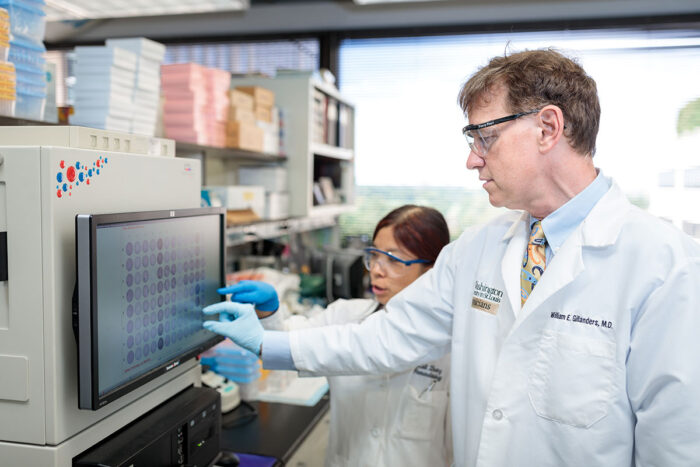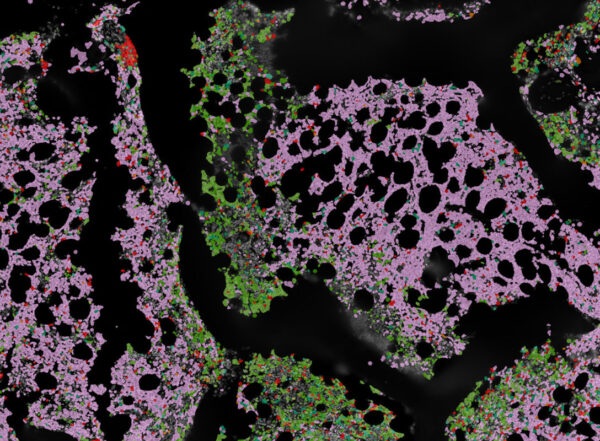Vaccine shows promise against aggressive breast cancer
Clinical trial targeted recurrence of hard-to-treat triple-negative breast cancer
 Matt Miller
Matt MillerA small clinical trial conducted at WashU Medicine shows promising results for patients with triple-negative breast cancer who received an investigational vaccine designed to prevent recurrence of tumors. Shown, William E. Gillanders, MD, (right) and Xiuli Zhang, MD, examine blood test results indicating study participants' responses to the vaccine. The early-stage trial indicated that the treatment is safe and elicits immune responses.
A small clinical trial shows promising results for patients with triple-negative breast cancer who received an investigational vaccine designed to prevent recurrence of tumors. Conducted at Washington University School of Medicine in St. Louis with a therapy designed by WashU Medicine researchers, the trial is the first to report results for this type of vaccine — known as a neoantigen DNA vaccine — for breast cancer patients.
The study, which found the vaccine to be well-tolerated and to stimulate the immune system, is available Nov. 14 in the journal Genome Medicine.
The phase I clinical trial — conducted at Siteman Cancer Center, based at Barnes-Jewish Hospital and WashU Medicine — involved 18 patients diagnosed with triple-negative breast cancer that was not metastatic, meaning it had not spread to other organs. Each patient received the standard of care and three doses of a personalized vaccine tailored to home in on key mutations in their specific tumor and train immune cells to recognize and attack any cells bearing these mutations.
Following treatment, 14 of 18 patients showed immune responses to the vaccine and, after three years, 16 patients remained cancer-free. While the early-stage trial was designed to evaluate safety of the vaccine and did not include a control group to determine efficacy, the researchers analyzed historical data from patients with triple-negative breast cancer treated with the standard of care only. In that group, on average, about half of patients remained cancer-free at three years post-treatment.
“These results were better than we expected,” said senior author William E. Gillanders, MD, the Mary Culver Distinguished Professor of Surgery at WashU Medicine who treats patients at Siteman. “Obviously, it’s not a perfect comparison, and we acknowledge the limitations of this type of analysis, but we are continuing to pursue this vaccine strategy and have ongoing randomized controlled trials that do make a direct comparison between the standard of care plus a vaccine, versus standard of care alone. We are encouraged by what we’re seeing with these patients so far.”
Triple-negative breast cancer is an aggressive tumor type that grows even in the absence of the hormonal fuel that drives growth of other types of breast cancer. To date, triple-negative breast cancer has no targeted therapies and is usually treated with traditional approaches that include surgery, chemotherapy and radiation therapy. For reasons that scientists are still investigating, this tumor tends to be more common among African American patients diagnosed with breast cancer. In this trial, one-third of the participants (six of 18) were African American.
For this trial, patients with triple-negative breast cancer who still had evidence of a tumor remaining after a first round of chemotherapy were eligible to participate. Such patients are at high risk of cancer recurrence even after the remaining tumor is surgically removed. After surgical removal, the research team analyzed and compared the tumor tissue with the same patient’s healthy tissue to find unique genetic mutations in the cancer cells. Such mutations in a patient’s cancer cells alter the proteins only in the tumor, making it possible to train the immune system to go after the altered proteins and leave healthy tissues alone.
Using software they designed, the researchers selected altered proteins — called neoantigens — that were made by the patients’ tumors and that were identified as most likely to trigger a strong immune response. On average, each patient’s vaccine contained 11 neoantigens (ranging from a minimum of four to a maximum of 20) specific to their tumor.
The software development was led by computational biologists Obi Griffith, PhD, a professor of medicine, and Malachi Griffith, PhD, an associate professor of medicine, both in the Division of Oncology at WashU Medicine. A related paper published simultaneously in the same journal describes the software tools they developed. One of their goals is to make these computational resources widely accessible to cancer researchers and clinicians worldwide.
“We hope to promote the use of this software for the design of cancer vaccines,” Malachi Griffith said. “These are complex algorithms, but in general, the software takes in a list of mutations and interprets them in the context of their potential to be good neoantigen candidates. The tools rank the possible neoantigens based on our current knowledge of what matters in stimulating the immune system to attack cancer cells. These software tools were developed with support from the National Cancer Institute, and they have an open license that makes them broadly available for both academic and commercial uses.”
Several studies of cancer vaccines are ongoing at Siteman. Vaccines for all of these trials are made in a WashU Medicine facility that meets the good manufacturing practice (GMP) requirements set by the Food and Drug Administration. In some of the vaccine clinical trials for breast cancer patients, personalized vaccines are being investigated in combination with immunotherapies called checkpoint inhibitors that boost the action of T cells.
“We are excited about the promise of these neoantigen vaccines,” Gillanders said. “We are hopeful that we will be able to bring more and more of this type of vaccine technology to our patients and help improve treatment outcomes in patients with aggressive cancers.”






